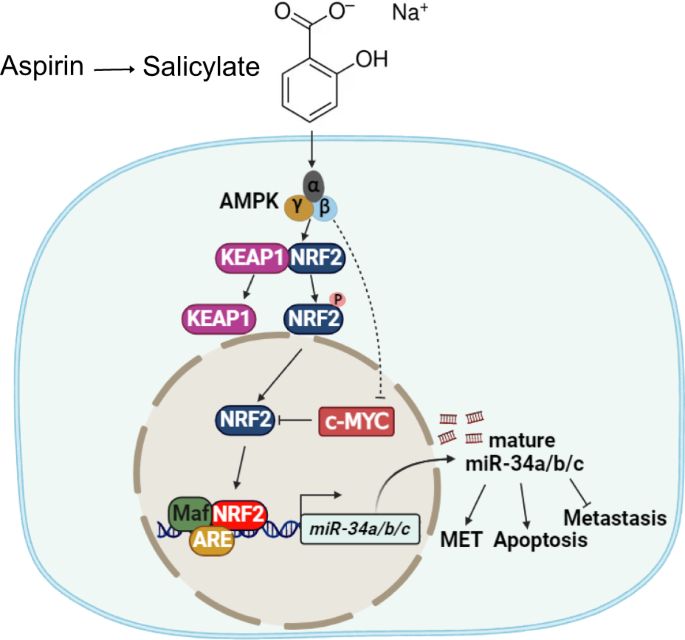2023-10-30 ミュンヘン大学(LMU)
◆新研究によれば、アスピリンは腫瘍抑制作用を持つ2つのmiRNA分子(miR-34aとmiR-34b/c)の産生を誘導し、アスピリンは酵素AMPKを活性化してNRF2転写因子を変更し、miR-34遺伝子の発現を促進します。アスピリンの効果はp53シグナル経路に依存せず、これは大腸がんで一般的に無効化されるp53遺伝子に依存しないため、アスピリンは将来的に大腸がん治療に利用できる可能性があると示唆されています。
<関連情報>
- https://www.lmu.de/en/newsroom/news-overview/news/bowel-cancer-aspirin-activates-protective-genes.html
- https://www.nature.com/articles/s41419-023-06226-9
サリチル酸はAMPKを誘導し、c-MYCを阻害してNRF2/ARE/miR-34a/b/cカスケードを活性化し、大腸がんの転移を抑制する Salicylate induces AMPK and inhibits c-MYC to activate a NRF2/ARE/miR-34a/b/c cascade resulting in suppression of colorectal cancer metastasis
Chunfeng Liu,Matjaz Rokavec,Zekai Huang & Heiko Hermeking
Cell Death & Disease Published:28 October 2023
DOI:https://doi.org/10.1038/s41419-023-06226-9
Abstract
Aspirin and its active metabolite salicylate have emerged as promising agents for the chemoprevention of colorectal cancer (CRC). Moreover, aspirin suppresses the progression of established CRCs. However, the underlying molecular mechanisms are not completely understood. Here we found that salicylate induces the expression of the miR-34a and miR-34b/c genes, which encode tumor suppressive microRNAs, in a p53-independent manner. Salicylate activated AMPK, thereby activating NRF2, which directly induced miR-34a/b/c expression via ARE motifs. In addition, salicylate suppressed c-MYC, a known repressor of NRF2-mediated transactivation, via activating AMPK. The suppression of c-MYC by salicylate was necessary for NRF2-mediated activation of miR-34a/b/c. Inactivation of miR-34a/b/c largely abrogated the inhibitory effects of salicylate on migration, invasion and metastasis formation by CRC cells. In the future, aspirin and its derivates may be used therapeutically to activate miR-34a and miR-34b/c in tumors that have lost p53.



